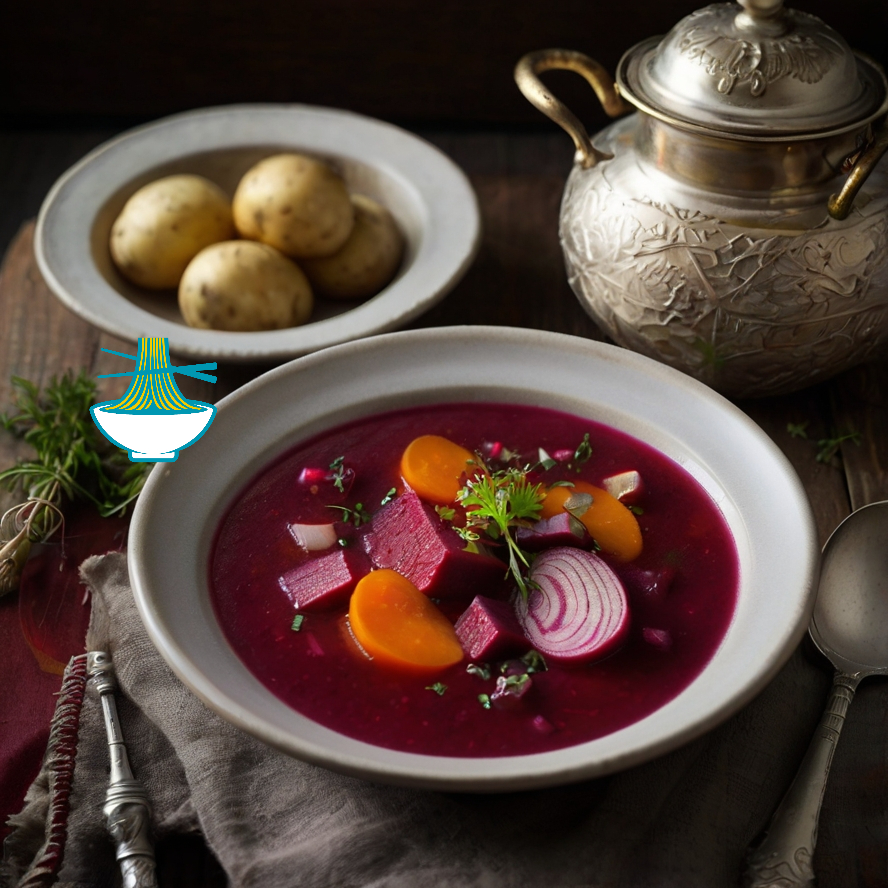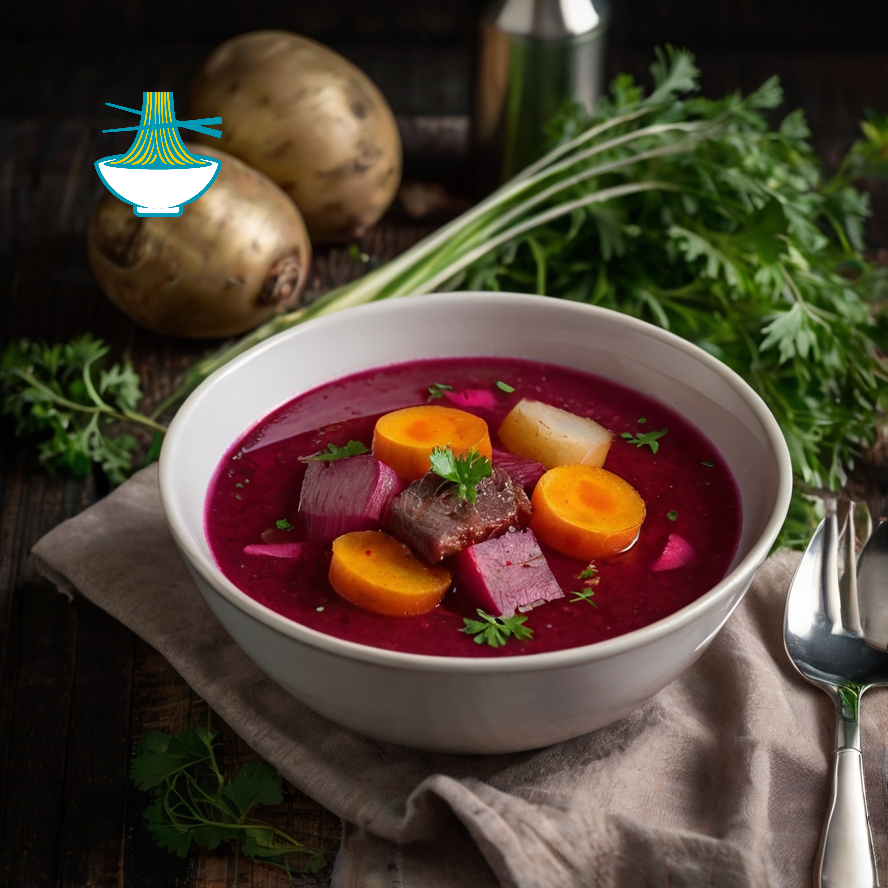Borscht, a hearty beetroot soup, boasts a rich history originating from Eastern Europe. Traditionally made with beef or pork broth, it's flavored with a variety of vegetables like potatoes, carrots, and cabbage. Its vibrant red hue and robust flavors make it a beloved dish, often enjoyed with a dollop of sour cream or a slice of rye bread. The recipe has evolved over centuries, reflecting the culinary traditions of the regions where it's enjoyed.
Ingredients:
- 4 medium beetroots, peeled and grated
- 2 medium potatoes, peeled and diced
- 2 carrots, peeled and grated
- 1 onion, finely chopped
- 2 cloves garlic, minced
- 4 cups beef or vegetable broth
- 2 cups shredded cabbage
- 2 tablespoons tomato paste
- 2 tablespoons olive oil
- 2 tablespoons red wine vinegar
- Salt and pepper to taste
- Sour cream and fresh dill for garnish (optional)
Method:
- In a large pot, heat olive oil over medium heat. Add onion and garlic, sauté until translucent.
- Add grated beetroots, carrots, and diced potatoes to the pot. Cook for about 5 minutes.
- Pour in the beef or vegetable broth and bring to a simmer. Add shredded cabbage and tomato paste.
- Season with salt, pepper, and red wine vinegar. Cover and simmer for 20-25 minutes, or until vegetables are tender.
- Taste and adjust seasoning if needed. Serve hot, garnished with a dollop of sour cream and fresh dill if desired. Enjoy!
Nutrition Value:
Beetroots:
- Calories: Approximately 43 calories per 100g
- Carbohydrates: 9.56g
- Protein: 1.61g
- Fat: 0.17g
- Sodium: 78mg
- Cholesterol: 0mg
- Vitamins: Contains vitamin C, folate (vitamin B9), and manganese.
- Minerals: Contains iron, potassium, magnesium, and phosphorus.
Benefits: Rich in antioxidants and fiber, which may help reduce inflammation and improve heart health.
Potatoes:
- Calories: Approximately 87 calories per 100g
- Carbohydrates: 20.13g
- Protein: 1.87g
- Fat: 0.1g
- Sodium: 6mg
- Cholesterol: 0mg
- Vitamins: Rich in vitamin C, vitamin B6, and potassium.
- Minerals: Contains potassium, magnesium, and phosphorus.
Benefits: Provides energy, vitamins, and minerals essential for overall health.
Carrots:
- Calories: Approximately 41 calories per 100g
- Carbohydrates: 9.58g
- Protein: 0.93g
- Fat: 0.24g
- Sodium: 69mg
- Cholesterol: 0mg
- Vitamins: Extremely rich in beta-carotene (vitamin A), vitamin C, and vitamin K1.
- Minerals: Contains potassium, phosphorus, and magnesium.
Benefits: Supports eye health, immune function, and skin health due to its high beta-carotene content and antioxidant properties.
Onion:
- Calories: Approximately 40 calories per 100g
- Carbohydrates: 9.34g
- Protein: 1.1g
- Fat: 0.1g
- Sodium: 4mg
- Cholesterol: 0mg
- Vitamins: Contains vitamin C, vitamin B6, and folate (vitamin B9).
- Minerals: Contains potassium, phosphorus, and magnesium.
Benefits: Provides flavor and aroma to dishes, along with antioxidants and anti-inflammatory properties.
Garlic:
- Calories: Approximately 149 calories per 100g
- Carbohydrates: 33.06g
- Protein: 6.36g
- Fat: 0.5g
- Sodium: 17mg
- Cholesterol: 0mg
- Vitamins: Rich in vitamin C, vitamin B6, and manganese.
- Minerals: Contains potassium, phosphorus, calcium, and iron.
Benefits: Offers immune-boosting, anti-inflammatory, and cardiovascular benefits.
Beef or Vegetable Broth:
- Nutritional composition varies depending on ingredients and preparation method.
- Typically provides protein, vitamins, and minerals, contributing to overall nutrition and flavor of the soup.
Shredded Cabbage:
- Calories: Approximately 25 calories per 100g
- Carbohydrates: 5.8g
- Protein: 1.28g
- Fat: 0.1g
- Sodium: 18mg
- Cholesterol: 0mg
- Vitamins: Rich in vitamin K, vitamin C, and folate (vitamin B9).
- Minerals: Contains potassium, manganese, and calcium.
Benefits: Low in calories, high in fiber, and rich in vitamins and minerals.
Tomato Paste:
- Calories: Approximately 82 calories per 100g
- Carbohydrates: 17.68g
- Protein: 4.32g
- Fat: 0.5g
- Sodium: 22mg
- Cholesterol: 0mg
- Vitamins: Contains vitamin C, vitamin K, and various B vitamins like niacin (vitamin B3) and folate (vitamin B9).
- Minerals: Contains potassium, phosphorus, and magnesium.
Benefits: Provides rich tomato flavor and antioxidants like lycopene.
Olive Oil:
- Calories: Approximately 884 calories per 100g
- Carbohydrates: 0g
- Protein: 0g
- Fat: 100g
- Sodium: 2mg
- Cholesterol: 0mg
- Vitamins: Contains vitamin E and vitamin K.
- Minerals: Contains small amounts of iron, calcium, and potassium.
Benefits: Rich in monounsaturated fats and antioxidants, beneficial for heart health and inflammation.
Red Wine Vinegar:
- Calories: Approximately 20 calories per 100g
- Carbohydrates: 0.06g
- Protein: 0g
- Fat: 0g
- Sodium: 8mg
- Cholesterol: 0mg
- Vitamins: Contains small amounts of vitamin C and vitamin K.
- Minerals: Contains small amounts of potassium.
Benefits: Adds tangy flavor and may offer some health benefits due to its antioxidant properties.
Salt:
- Consumed in small amounts, negligible calorie contribution.
- Provides sodium, essential for electrolyte balance and nerve function.
- Excessive intake may contribute to high blood pressure in some individuals.
Pepper:
- Negligible calorie contribution.
- Contains antioxidants like piperine, which may have anti-inflammatory properties.
- Adds flavor and spice without added sodium.
Sour Cream:
- Calories: Approximately 193 calories per 100g
- Carbohydrates: 4.14g
- Protein: 2.07g
- Fat: 19g
- Sodium: 20mg
- Cholesterol: 81mg
- Vitamins: Contains vitamin A, vitamin B12, and riboflavin (vitamin B2).
- Minerals: Contains calcium, phosphorus, and selenium.
Benefits: Adds richness and creaminess to dishes, along with vitamins and minerals.
Fresh Dill:
- Negligible calorie contribution.
- Contains vitamins like vitamin A, vitamin C, and folate (vitamin B9).
- Provides minerals like calcium, iron, and magnesium.
- Offers antioxidant properties and may have digestive benefits.
- Adds freshness and aroma to dishes as a garnish.


Comments